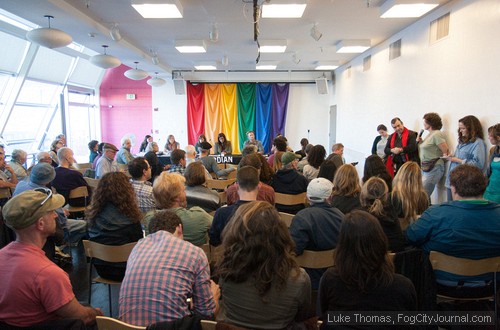
A community forum sponsored by the San Francisco Bay Guardian was held Wednesday at the LGBT Center. Photos by Luke Thomas.
By Josh Wolf
Editor’s Note: A version of this story was originally published by Journalism that Matters and is republished here with permission.
August 1, 2013
The editorial leadership of the San Francisco Bay Guardian sat down with their readers Wednesday at a community forum to discuss how they should move forward following the departure of longtime editor Tim Redmond.
Depending on who you talk to, Redmond was either fired or he resigned after refusing in June to axe three of six newsroom staff. After 31 years at the paper, Redmond’s ouster quickly resonated across the San Francisco progressive community and there was a growing perception that this would be the end of San Francisco’s seminal alternative weekly after being in print since 1966.
For some people the news wasn’t surprising. When the San Francisco Print Media Company – which also owns the San Francisco Examiner and the SF Weekly – purchased the Guardian last year, some began to wonder if the new owners really intended to maintain two competing weekly newspapers. The news that Redmond was out only served to enforce this theory.
“Since then we’ve been asking ourselves a lot of questions,” said SFBG News Editor Rebecca Bowe during opening remarks. “The biggest question is, where do we go from here?”
“We realized that what really made the most sense was to just sit down and do some listening – and that’s why we wanted to have a community forum,” Bowe added.
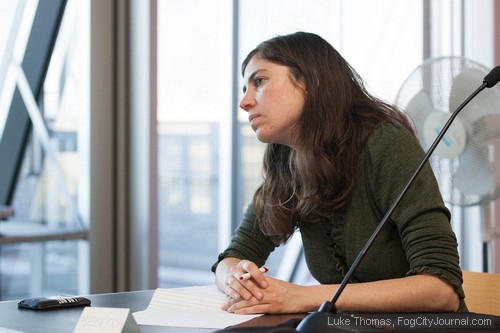
SFBG News Editor Rebecca Bowe.
Following opening remarks, Bowe introduced newly-minted Guardian Editor Steven Jones, who had initially been passed over for the position after Redmond’s departure but recently led successful negotiations with The San Francisco Print Media Company to restore and protect the Guardian’s editorial autonomy.
“I’ve been at the Guardian since 2003,” Jones said. “The reason I wanted to work at the Guardian is because it’s a very special place and it practices a kind of journalism that used to be really important in this country that we’ve sort of lost recently.”
“Journalism that has a perspective,” Jones explained, “that has a value system.”
“I’ve always seen the Guardian as really fighting for the soul of San Francisco,” Jones added. “We’re fighting a battle to win here. To create an informed and engaged citizenry. I think we were all tempted to follow Tim (Redmond) out the door and I think ultimately where we came down for all of us is that the Guardian is really more than any individual.”
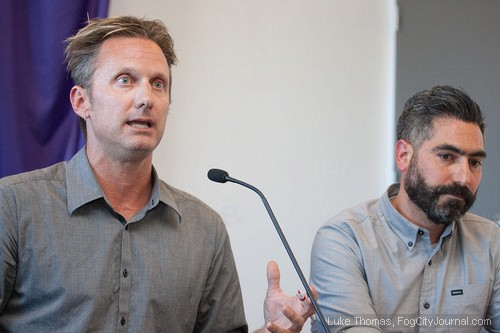
SFBG Editor Steven T. Jones (left).
Before turning the forum over to the audience, recently assigned Publisher Marke Bieschke, who previously worked as the paper’s senior culture editor, offered three questions that he said staff was particularly interested in exploring.
“The first question is, what would you like to see the Guardian cover more of? The second question is, what do you feel is missing in Bay area journalism right now?” Bieschke asked. “We’re looking towards your ideas to kind of hit the refresh button on journalism in the Bay Area in general, and to bring up some of the great journalism that’s happening right now.”
Bieschke called on the 100 or so in attendance at the LGBT Center to consider what voice the Bay Guardian should adopt moving forward.
“Are we being too strident? Do you miss our stridency?” Bieschke asked. “Are we not being in-depth enough, are we being too hip?”
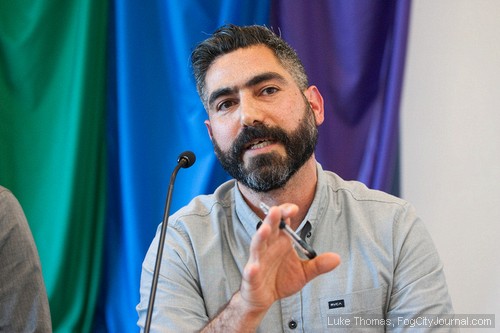
SFBG Publisher Marke Bieschke.
Not surprisingly, when it came time to pass the mic around the room, Bieschke’s questions quickly took a backseat to whatever Guardian readers had come to discuss.
“The concern I have, and I think I’m not the only one, is with the Guardian, the Weekly and the Examiner under the same management, under the same ownership, am I right folks?” asked Diamond Dave Whitaker, a beloved poet and legendary San Francisco figure who turned Bob Dylan onto cannabis more than 50 years ago, whose comments generated applause. “I think we now have a new layer of management who have come, who are bound to have their own priorities, their own agenda.”
Although Diamond Dave had left by the time Todd Vogt, CEO of the San Francisco Print Media Company, spoke on his plans for the Guardian, much of the audience seemed relieved to hear the paper wasn’t on the chopping block.
“I make a commitment to all of you tonight that so long as I have any role, or involvement, or ownership in the San Francisco Print Media Company – the Guardian will continue to be published as a print product, continue to have a presence online; that it will continue to maintain its progressive voice, led by progressives, managed by progressives, with a diversity of voice, a diversity of comment and content,” Vogt said. “I think that this is a great opportunity for the Guardian to re-engage with the progressive community, to re-engage with new citizens of San Francisco – progressive or not – and to reinvigorate the voice that they’ve had for so long.”
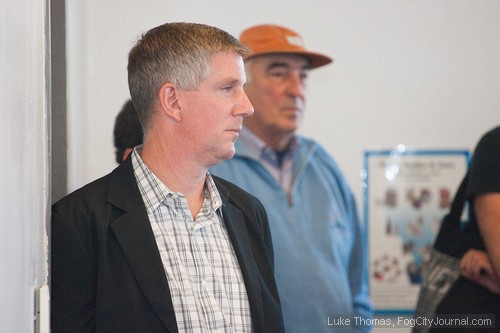
San Francisco Print Media Company CEO, Todd Vogt.
Some people did make requests for more coverage around the issues they hold closest. Others called for more in-depth investigative reporting, but the overarching theme throughout the conversation was that the San Francisco Bay Guardian is a progressive institution whose decline parallels the city’s tech-driven transformation.
“What gets me upset is when I see 40-story buildings. When I see the zoning laws change all over the city so that wealthy condominiums, or condominiums for the wealthy, will go up and push so many of us out,” said one participant who has previously written for the Guardian. “When I hear the phrase ‘Soul of San Francisco,’ the soul of San Francisco is for an immense loving rebellious warm community, so diversified it was a blessing on this earth and infected this whole earth. Now if the new ownership of the paper has that within themselves, like a lit candle, a lit candle for the soul of San Francisco – we will do well.”
As anyone over 30 who grew up in the Bay Area knows, this is not the first time the city has fought to hold onto its soul, but there is a growing fear that this could be the last fight for the soul of San Francisco.
“I grew up with the Guardian from the 90s as a young-adult,” said City Supervisor John Avalos, one of five elected officials in attendance, including Sheriff Ross Mirkarimi, Supervisor David Campos and College Board Trustees Chris Jackson and Rafael Mandelman. “What was really great about the lead-up from the 90s to the year 2000 was that there was a whole effort in San Francisco, and a recognition that the city was changing – up and underneath us – and that we actually could not keep up with the high cost of living, and we were seeing run-away development displacing people all across San Francisco.”
“The year 2000 was one when there was actually a resonance between what was happening in San Francisco and what the Guardian was also reporting on,” Avalos continued. “I think now we’re reaching that tipping point all over again.The city is actually getting away from us again and the Guardian can play a role in helping to underscore what’s happening, and helping people to direct us into ideas and points of view and efforts of organizing to resist that which is going on.”
Although the staff are keenly aware of the changing demographics within the city, the Guardian has struggled to engage this new wave of San Franciscans. Shortly before the forum was about to begin, the woman sitting next to me shrewdly pointed out how hardly anyone at the forum appeared to be from the tech community.
“There’s this whole new group of these young tech-savvy, relatively apolitical, vaguely libertarian, kids in the city. And yeah, we want to find out ways to speak to them,” Jones said. “We’ll try anything. We really want to expand our readership and we think – not just for our own business model – we think its really important for the soul of the city to win over a lot of these young people that don’t understand the history of the city and are not engaged in its political dynamic.”
Josh Wilson, a Journalism That Matters alum who attended the Amherst, DC, and Silicon Valley gatherings, suggested “tech-savvy, relatively apolitical, vaguely libertarian, kids” might be more receptive to the Guardian’s message if the paper steps away from its perspective-based reporting.
“I just wanted to propose that there might be a difference between the San Francisco Bay Guardian, as a voice for progressive politics, versus the San Francisco Bay Guardian being a source of reporting on issues of interest to progressive politics,” said Wilson. “The former being a voice, might not be as strong because the issues and the politics become so inward-turning that they might not be as valuable to people who want issues in their daily lives covered with depth and fairness.”
The words “Raising Hell Since 1966” are now emblazoned across the top of every issue of the Bay Guardian, and they have repeatedly demonstrated this mantra. But what is the future of the Bay Guardian – and the Soul of San Francisco – if the new denizens of the city have no interest in raising hell and would prefer to leave the politicians alone?
“I think it’s really on San Franciscans to decide what kind of city you want to fight for, and to fight for that kind of city,” Avalos said. “It’s going to take not just reading the Guardian, but actually meeting face-to-face with our residents, with our neighbors and with our community members to really create that change. But we are in really dire need right now.”
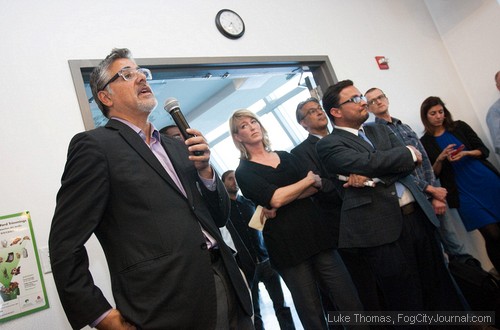
Supervisor John Avalos.
More photos
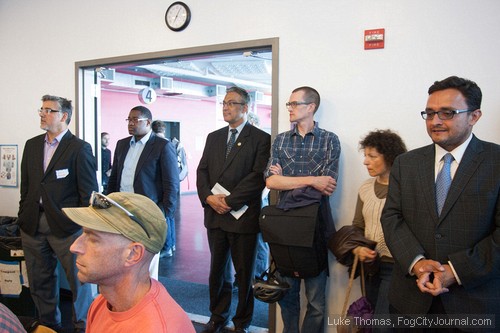
Several electeds attended the community forum including Supervisor David Campos (right) who has recently announced his candidacy for California Assembly.
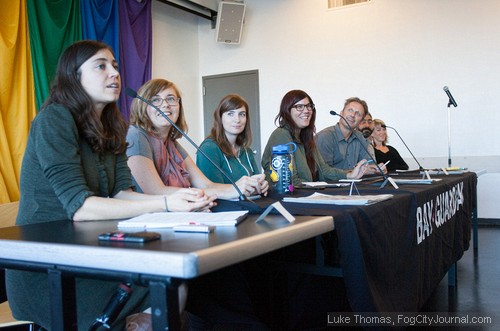
The SFBG editorial panel included News Editor Rebecca Bowe, Art Director Brooke Robertson, Senior A&E Editor Cheryl Eddy, Music Editor Emily Savage, Editor Steven T. Jones and Publisher Marke Bieschke. DCCC Vice Chair Alix Rosenthal moderated the forum.




 The Hunger Site
The Hunger Site
October 4, 2013 at 1:55 pm
This forum was a sham. The Guardian sold to the Owner of the SF Examiner is all we need to know. For those 5 journalists to sit there knowing that Tim Redmond was fired was an abomination. They should have scolded the owner for the firing. Instead like lemmings they did nothing.
August 2, 2013 at 12:29 pm
” Fighting for the Soul of San Francisco ” The past is the past the best we can hope for is a moderate San Francisco. With a major shortage of office space, Tech companies clamoring to establish in SF.
Condos being sold and leased before buildings completed, take the high rise at 10th and Market a third already sold or leased, rent for a 1br going $4,000 +
Even our local sups are moderate excepting Campos and Avalos which are being termed out.
August 2, 2013 at 7:46 am
The SFBG would be more effective if they could get out of victim mode. People are tired of hearing about all the awful things that mean people like Ed Lee and Ron Conway and Chuck Nevius and the Chronicle and the Google bus people have done to poor defenseless us.